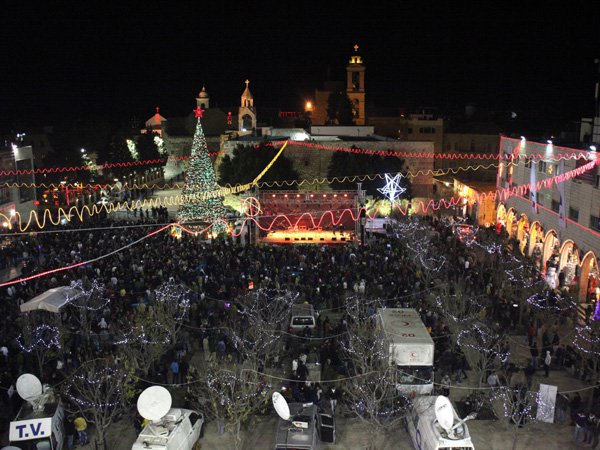December 25, 2011
Luke 2:1-14
Each year at Christmastime I remember with gratitude an opportunity that I had while I was studying in Europe in the 1980s. I was able to travel to Israel and visit the city of Bethlehem.
To travel in Israel an official guide is required. We had a particularly good one on this trip. As he brought us to the Church of the Nativity, he explained its history. It was built by the Emperor Justinian 1500 years ago over a cave where tradition says that Christ was born. He showed us how the door to the church was purposely made to be only four feet high, so that everyone who came to the church would be forced to bow as they entered. Then, he brought us to the most sacred part of the church, the grotto located underneath the altar. This was the place where tradition says Christ was born. On the marble floor of the grotto is a fourteen-point silver star that marks the spot where Mary first laid her newborn son.
Because the grotto is small, you have to wait in line to enter. You wait in a darkened corridor for people to exit so there will be room for others to go in. As I was waiting in that corridor, I had a rather clear view of what was going on inside the grotto. It was a bustle of activity. People were moving everywhere examining the inscriptions and the mosaics on the walls. Flashes were going off. Video-cameras were whirling. People were posing for pictures with their family and friends, many of them pointing to the star on the floor. There was even a group of Germans in the corner singing Christmas carols.
But right in the center of the grotto, I could see a woman in her 20s. She was kneeling on the floor before the star, perfectly still. Her eyes were closed, her head was bowed. Her demeanor set her in stark contrast to all the activity bustling around her. I turned to the guide who was standing next to me and pointed her out. He nodded. He said, “The people inside are tourists. This woman is a pilgrim.”
My prayer for all of us is that we would celebrate this Christmas not as tourists but as pilgrims. And what is a pilgrim? There are two possible definitions, and both of them apply. The first definition is “a pilgrim is one who journeys to a holy place.” I would invite all of you to journey this Christmas ready to see the holiness in your life. We should be able to see more than the surface things which tourists can photograph. Christmas is more than placing food on the table, opening presents, taking photographs of family and friends. There is in all that we have and in all that we are a deep abiding holiness which comes from the hand of God. Be sure to see that holiness in the bounty of your table, in the wonder of your children, in the warmth of family and friends who gather. Be sure to see the holiness in your lives and, as pilgrims, give thanks to God.
The second definition of the pilgrim is equally important. It defines a pilgrim as “one who journeys in a foreign land.” There are many people this Christmas who find themselves journeying in new and sometimes difficult places. We should remember the men and women serving in our armed forces. We should remember all people in the world who are displaced by war and famine. We should remember immigrants who are separated from their families. We should remember those who are grieving the loss of a loved one, dealing with the estrangement of divorce, struggling with economic hardship that comes from unemployment. All of these people are pilgrims, forced to journey away from what is normal. If you are one of them, remember that, like all pilgrims, you are still able to find holiness in your circumstances. The very Christmas story makes this clear. For Mary and Joseph had to journey from their home, from their place of comfort, and give birth to their son in a strange place, indeed, even in a manger.
All of us, regardless of our circumstances, are called to celebrate this Christmas as pilgrims. If we are fortunate enough to look forward to rich meals and warm relationships with family and friends, be sure to see the holiness that is present in all of those gifts. If we are forced to be pilgrims travelling in strange and difficult places, remember that the child whose birth we celebrate was himself born in a foreign city and therefore made holy all who are displaced. Thousands of people will gather in Bethlehem this weekend. But you do not need to go to Bethlehem to be a pilgrim. Let us all, regardless of our circumstances, come to the manger and, with faith, worship the newborn King.

